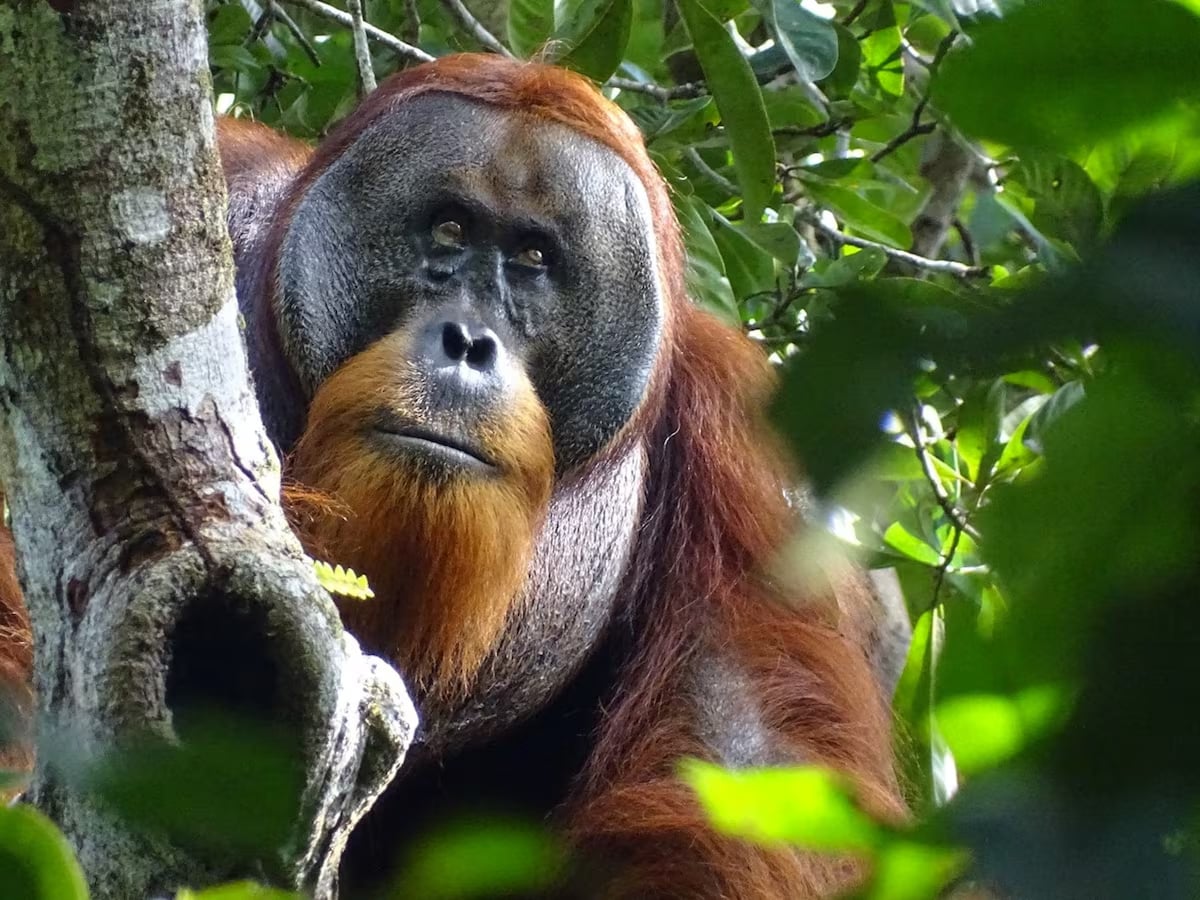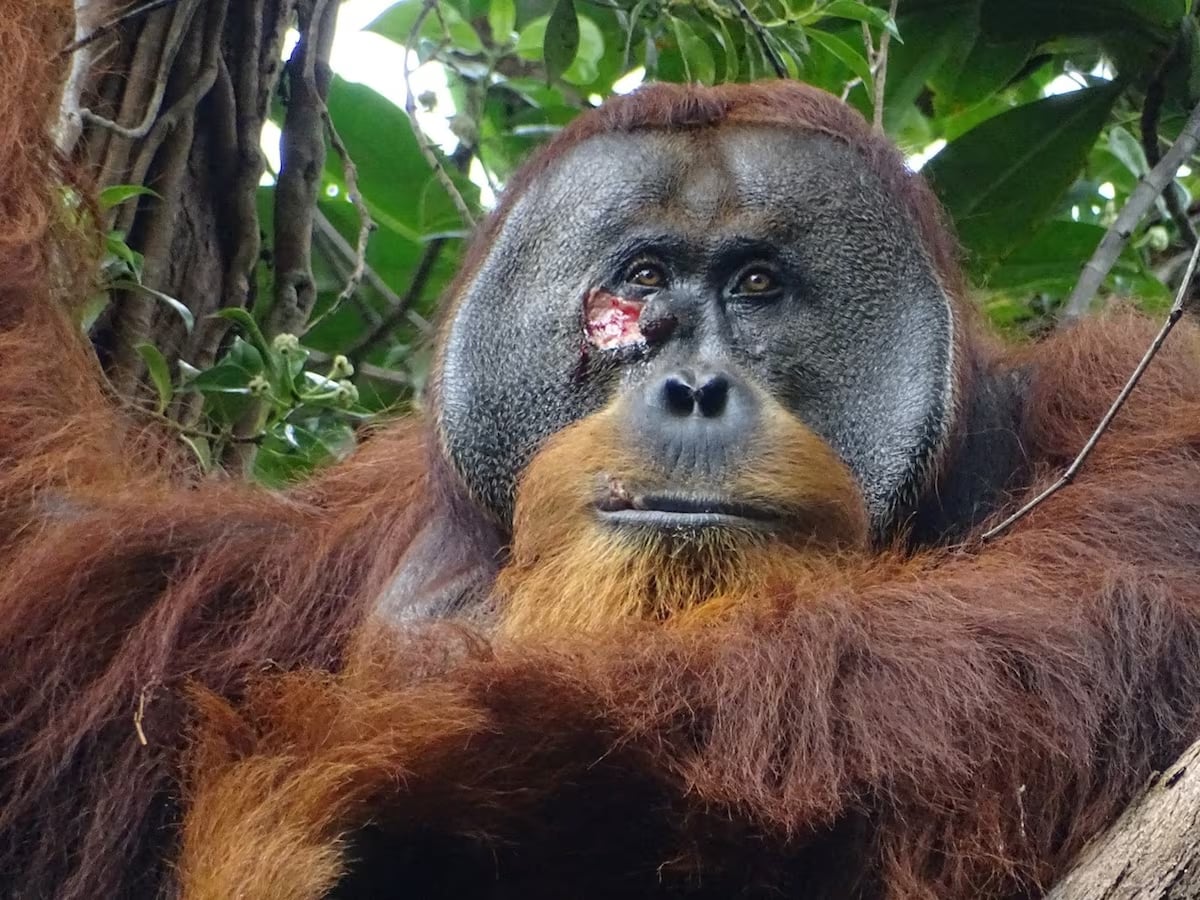In June 2022, a male Sumatran orangutan named Rakus sustained a facial wound below the right eye, apparently during a fight with another male orangutan at the Suaq Balimbing research site, a protected rainforest area in Indonesia. What Rakus did three days later really caught the attention of scientists.
Researchers on Thursday described observing how Rakus appeared to treat the wound using a plant known for its pain-relieving properties and for supporting wound healing due to its antibacterial, anti-inflammatory, anti-fungal and antioxidant qualities.
The orangutan chewed the plant's leaves to produce a liquid that Rakus repeatedly smeared on the wound and then applied the chewed-up plant material directly to the injury, much like a wound plaster administered by doctors, according to primatologist and cognitive biologist Isabelle Laumer of the Max Planck Institute of Animal Behavior in Germany.
Rakus also ate the plant, an evergreen vine commonly called Akar Kuning - scientific name Fibraurea tinctoria, added Laumer, lead author of the study published in the journal Scientific Reports. This plant is rarely eaten by orangutans in this peat swamp forest area, home to about 150 critically endangered Sumatran orangutans.
|
|
| A male Sumatran orangutan named Rakus, with a facial wound below the right eye, is seen in the Suaq Balimbing research site, a protected rainforest area in Indonesia, two days before the orangutan administered wound self-treatment using a medicinal plant, in this handout picture taken June 23, 2022. Photo: Armas/Max Planck Institute of Animal Behavior/Handout via Reuters |
"To our knowledge, this is the first documented case of active wound treatment with a plant species with medical properties by a wild animal," said study senior author Caroline Schuppli, an evolutionary biologist at the institute.
Rakus, believed to have been born in 1989, is a flanged male, with large cheek pads on both sides of the face - secondary male sexual characteristics. Rakus was one of the area's dominant males.
The researchers said the orangutan's wound self-treatment did not appear to be happenstance.
"His behavior appeared to be intentional. He selectively treated his facial wound on his right flange with the plant juice, and no other body parts. The behavior was repeated several times, not only plant juice but later also more-solid plant material was applied until the wound was fully covered. The entire process took a considerable amount of time," Laumer said.
The wound never showed signs of infection and closed within five days, the researchers said.
"The observation suggests that the cognitive capacities that are needed for the behavior - active wound treatment with plants - may be as old as the last common ancestor of orangutans and humans," Schuppli said. "However, what these cognitive capacities exactly are remains to be investigated. Whereas this observation shows that orangutans are capable of treating their wounds with plants, we don't know to what extent they understand the process."
The last common ancestor of orangutans and humans lived about 13 million years ago.
Orangutans are one of the world's great apes - the closest living relatives of humans - alongside chimpanzees, bonobos and gorillas. Orangutans are the least closely related to humans of them but still share approximately 97% of our DNA.
"It is possible that wound treatment with Fibraurea tinctoria emerges through accidental individual innovation. Individuals may accidentally touch their wounds while feeding on Fibraurea tinctoria and thus unintentionally apply the plant's juice to their wounds," Laumer said.
"But it may also be," Laumer added, "that Rakus has learned this behavior from other orangutans in his birth area."
This plant, widely distributed across China, Indonesia, Malaysia, Thailand, Vietnam and other parts of Southeast Asia, is used in traditional medicine to treat conditions such as malaria.
Orangutan means "person of the forest" in the Indonesian and Malay languages, and these apes are the world's biggest arboreal mammal. Orangutans, adapted to living in trees, live more solitary lives than other great apes, sleeping and eating fruit in the forest canopy and swinging from branch to branch.
"Orangutans have high cognitive abilities, in particular in the area of physical cognition," Schuppli said. "They are known to be excellent problem-solvers. Wild orangutans acquire their skill sets via observational social learning, and skills get passed on from generation to generation. The population where this observation was made is known for its rich cultural repertoire, including tool use in different contexts."




















































